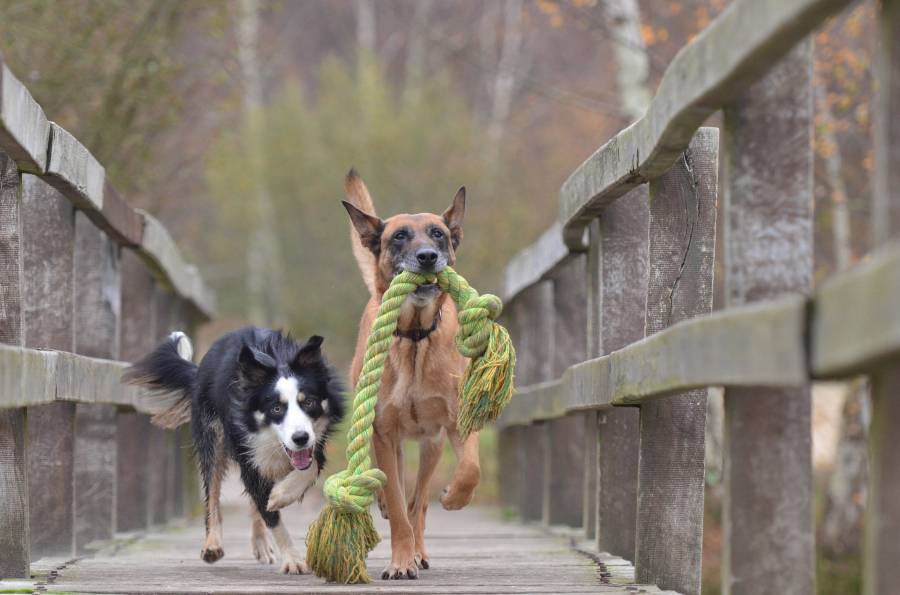Quick Navigation
If you own a dog, you understand that accidents happen, but what should you do if your dog hit his head but seems fine?
Sometimes, those accidents can cause serious head injuries leading to trauma.
Head traumas are common in dogs, and sometimes their injuries don’t always show up immediately.
If your dog hits its head on something that seems okay, the owner must know how to handle this situation because there is no way to know what happened to your dog without seeing the vet.

The dog might seem perfectly fine outside, but something wrong is cooking inside its brain.
Here Is What To Do if Your Dog Hit His Head but Seems Fine
1. Check the Dog’s Eyes
The first thing that an owner should check when they see a dog with a head injury is the animal’s eyes.
A dog who has been injured will often have watery eyes, which means that it may be suffering from internal bleeding.
Internal bleeding is a crucial situation for the dog that it needs immediate medical attention.
2. Look at the Dog’s Nose
Another critical part of checking a dog’s head injury is looking at the animal’s nose.
When a dog hits his head, it usually loses consciousness, so the nose will likely be swollen.
Also, the nose might bleed.
If your dog appears to have any bleeding, call your vet right away.
You may also want to take him to the emergency room for an x-ray.
3. Listen For Snoring
A third step in checking a dog’s head injury after hitting his head but seems fine is listening for snoring sounds.
Dogs who have suffered head injuries tend to snore more than usual.
You should listen closely to see if the dog makes any unusual noises.
If it does, call your veterinarian right away.
4. Observe the Dog’s Behavior
When your dog hits his head but seems fine, observe its behavior.
An injured dog will not move around normally.
It will also be reluctant to play and eat.
These are all signs that the dog has sustained a head injury.
When your dog is typically playful and active but suddenly becomes lethargic after hitting his head but seems fine, it’s a sign that something must be up with it.
So if you notice that your dog is sleeping more than it usually does, even dozing off most of the time, or won’t wake up when nudged or moved, it’s best to bring your dog to the vet immediately.
This ensures that your dog receives proper medical attention and care in case of head trauma.
Another behavior you should note is when you see your dog pressing its head after the accident, which must be unusual for its daily routine.
This could also mean that your dog is feeling pain in its head, and taking it to the vet is your best way to ensure it is okay.
If you also observe noticeable disorientation and loss of balance, especially when you know that your dog is sure-footed, then your dog may not be okay.
5. See if Your Dog Has Any Symptoms
Finally, if your dog hits his head but seems fine, ask yourself whether your dog has any other symptoms besides the ones mentioned above.
For example, if your dog has trouble walking, vomiting, or having seizures, it could mean that it has suffered a head injury.
In such cases, you need to take your dog to the vet as soon as possible.
Types of Head Injuries in dogs
If your dog hits his head but seems fine, it is advisable to watch for internal head injuries signs.
There are many types of internal head injuries in dogs.
Some of them are more serious than others.
The most common ones include:
1. Concussion
It occurs when there is bleeding inside of the skull, which causes swelling.
Injury may damage the brain.
If this happens, the dog will seem fine at first.
However, he could start having other signs such as seizures.
2. Skull Fractures
These occur when the bones inside the skull break apart.
It usually happens because of an accident.
You might notice blood coming out of the nose or mouth, and the dog might seem confused. The dog might even vomit.
3. Brain Hemorrhage
It occurs when blood leaks into the brain.
Often, it happens when the dog falls off of a ladder.
There may be vomiting and confusion.
4. Cranial Hemorrhage
It occurs when blood leaks into the brain tissue.
It often happens after a dog gets knocked unconscious or hits his head hard on something.
5. Brain Swelling
When a dog hits his head hard. the brain could swell, pushing against the skull.
It causes pressure on the nerves and blood vessels near the brain’s surface.
6. Encephalitis
It is inflammation of the brain.
It can cause seizures and other problems.
7. Hydrocephalus
It is an excessive buildup of cerebrospinal fluid in the brain.
It can lead to paralysis and death.
How Can I Tell if My Dog Has Suffered From a Brain Injury?
Many people think that their dog seems fine even after hitting his head hard, but this isn’t always true.

It would be best to look closely at your dog’s behavior and appearance.
Symptoms of brain injury in dogs are similar to those seen in humans.
Here are some of the most common symptoms:
- Vomiting
- Seizures
- Lethargy
- Confusion
- Headache
- Dizziness
- Difficulty standing up
- Weakness
- Pale gums
- Fever
Most dogs with head injuries don’t show any signs until several hours later.
So don’t just sit back if it happens that your dog hit his head but seems fine.
However, some dogs with severe head injuries may show symptoms within minutes.
If you notice your dog hit its head and show the above symptoms afterward, it’s time to call your veterinarian.
He’ll be able to diagnose your dog’s condition and decide whether further treatment is needed.
What Should You Do After Your Dog Hit His Head but Seems Fine?
As mentioned earlier, if your dog hits his head and seems just fine, you should;
1. Take Your Dog to the Vet
Your vet will examine your dog and determine whether he needs further testing.
He’ll also make sure that your dog is comfortable before sending him home.
If your dog doesn’t seem too injured after the exam, you can give him plenty of rest at home.
Once your dog is diagnosed with a head injury, the vet will treat him accordingly.
Treatment options depend on the severity of the damage.
For minor injuries, like bumps and bruises, the vet might recommend ice packs, painkillers, and rest.
More severe cases require more complex treatments.
These include Surgery, Antibiotics, Medication, Nutrition, Behavioral therapy, Physical Therapy, and Home Care.
2. Get Your Dog Checked Out by a Vet Specializing in Treating Dogs With Concussions
This person will perform additional tests to determine how severe your dog’s injuries are.
If your dog has suffered a concussion, he may require a few days of observation and rehabilitation.
You may consider keeping your dog overnight to recover in a familiar environment.
3. Other Considerations
If your dog’s injuries aren’t severe enough to warrant hospitalization, you can still do something to improve his recovery.
For example, you can provide him with a soft bed and lots of food and water.
You can also play soothing music, read books, or watch TV to distract him.
These things will help your dog relax and feel more comfortable.
Even though your dog may appear fine now after hitting his head on something, there’s a chance that he could experience complications later.
Conclusion
Head traumas are prevalent among dogs.
Most dogs don’t show any outward signs of these injuries, making them difficult to diagnose.
That’s why it’s important to know what to look for when your dog starts acting strangely.
If you suspect that your dog has sustained a concussion, contact your veterinarian immediately.
Remember that your dog’s health is vital.
So, be sure to pay attention to any changes in his behavior and report anything unusual to your vet.

A passionate content creator on pet behavior, nutrition choices, and health, Mike is an experienced pet expert. He has been writing on multiple websites to compensate for his passion for cats. Mike grieves around plenty of pets in his parents’ house. At the start of his career, he had a sturdy intention to be a part of pet care by any means.
With his affiliation to Purrfect n’ Pawesome, he found a way to satiate his craving to participate in pet health, wellness, and behavior analysis. He has been a significant part of our team and a major contributor in equipping our site with useful, authentic, and research-backed articles.
“I love pets as much as I love to travel to explore multiple places and lifestyles. I have been attached to this pawsome platform for many years, and my experience regarding pets has enhanced significantly by using various devices to write articles. I believe in writing my thoughts and experiences, so I try to write down the experience and learnings for my readers no matter where I am and what my mood is.”
